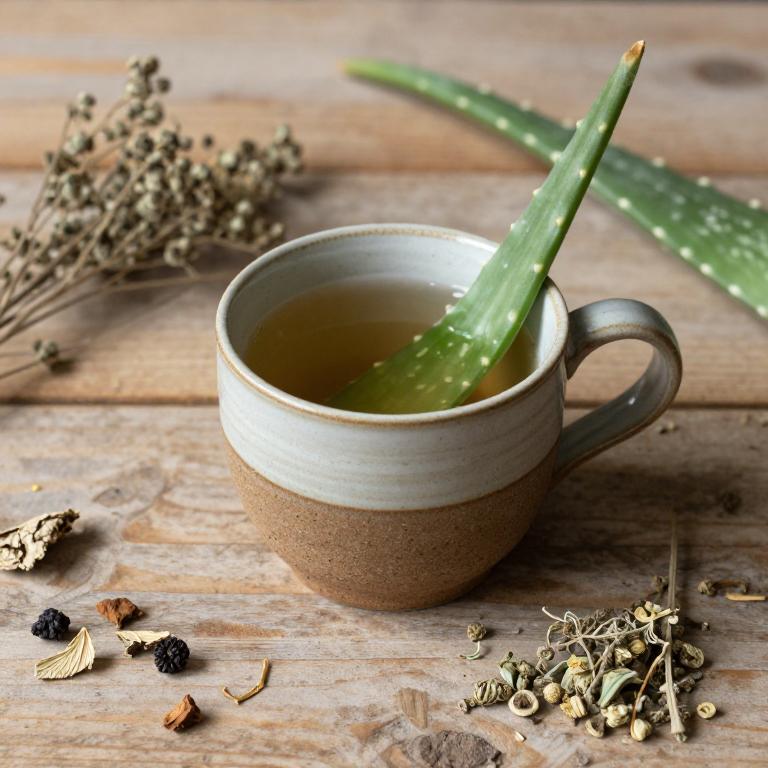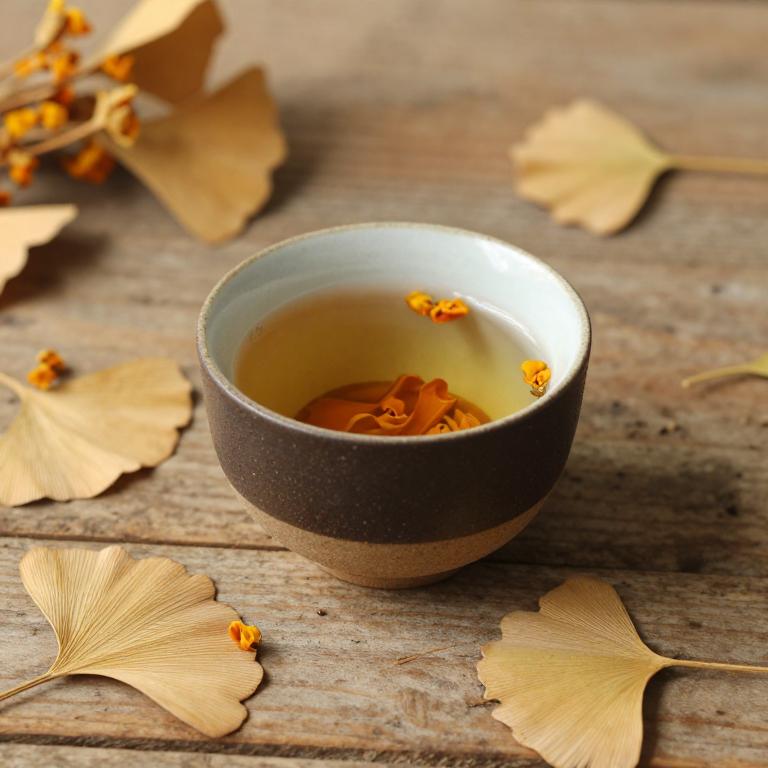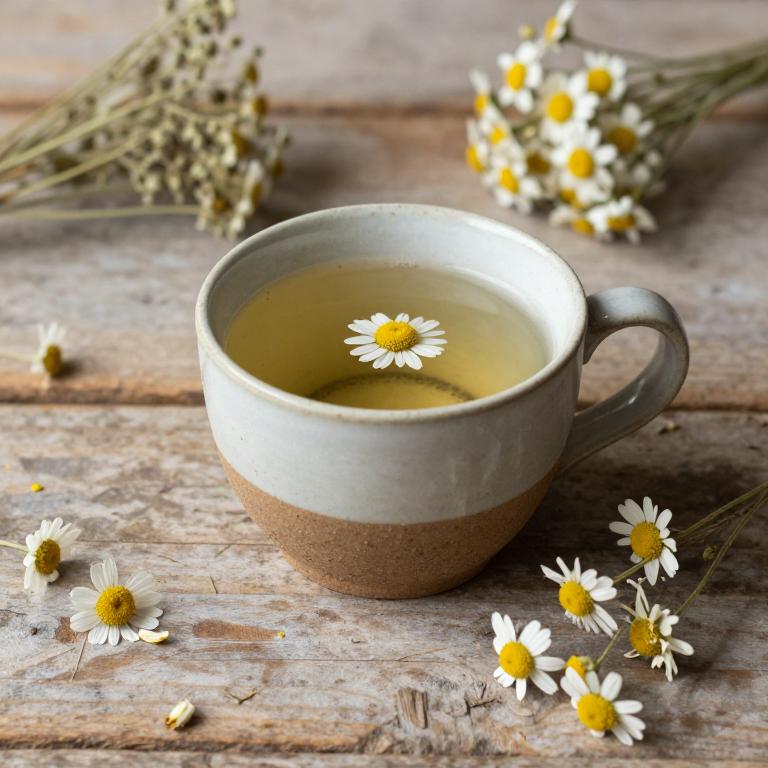10 Best Herbal Teas For Bleeding Gums

Herbal teas can be beneficial for bleeding gums due to their natural anti-inflammatory and astringent properties, which help reduce swelling and promote healing.
Chamomile, licorice root, and green tea are commonly recommended for their soothing effects on the gums. These teas can help strengthen the gum tissue and improve overall oral health by reducing bacteria that contribute to gum disease. However, it's important to consult a dentist before using herbal teas as a treatment, especially if the bleeding is persistent or severe.
Incorporating herbal teas into a daily routine, along with good oral hygiene, can support healthier gums and prevent further complications.
Table of Contents
- 1. Salvia (Salvia officinalis)
- 2. Stinging nettle (Urtica dioica)
- 3. Rosemary (Rosmarinus officinalis)
- 4. Echinacea (Echinacea purpurea)
- 5. Aloe vera (Aloe barbadensis)
- 6. St. john's wort (Hypericum perforatum)
- 7. Camellia (Camellia sinensis)
- 8. Ginkgo (Ginkgo biloba)
- 9. German chamomile (Chamomilla recutita)
- 10. Chaste tree (Vitex agnus-castus)
1. Salvia (Salvia officinalis)

Salvia officinalis, commonly known as sage, has been traditionally used in herbal teas to address various health concerns, including bleeding gums.
The plant contains compounds such as rosmarinic acid and flavonoids, which possess anti-inflammatory and astringent properties that may help reduce gum inflammation and bleeding. When prepared as a herbal tea, sage can be consumed orally to soothe the mouth and promote healing of gum tissues. However, it is important to consult with a healthcare provider before using sage tea, especially for individuals with existing health conditions or those taking medications.
While some studies suggest potential benefits, more research is needed to fully understand its efficacy for treating bleeding gums.
2. Stinging nettle (Urtica dioica)

Urtica dioica, commonly known as stinging nettle, is a medicinal plant that has been traditionally used for its various health benefits, including supporting oral health.
Herbal teas made from stinging nettle are believed to help reduce inflammation and promote healing in the gums, which can be beneficial for individuals experiencing bleeding gums. The tea contains antioxidants and anti-inflammatory compounds that may help soothe irritated gum tissues and improve overall oral hygiene. However, it is important to consult with a healthcare professional before using stinging nettle tea, especially if you have underlying health conditions or are taking medications.
While some people find relief from bleeding gums through regular consumption of stinging nettle tea, it should not replace professional dental care.
3. Rosemary (Rosmarinus officinalis)

Rosmarinus officinalis, commonly known as rosemary, is a fragrant herb that has been traditionally used for its medicinal properties, including its potential benefits for oral health.
Rosemary herbal tea may help reduce inflammation and promote healing in the gums, which can be beneficial for individuals experiencing bleeding gums. The tea contains antioxidants and anti-inflammatory compounds that support overall gum health by combating bacterial infections and reducing irritation. Regular consumption of rosemary tea may contribute to improving oral hygiene and preventing gum diseases.
However, it is advisable to consult a healthcare professional before using rosemary tea as a treatment for bleeding gums, especially if the condition persists or is severe.
4. Echinacea (Echinacea purpurea)

Echinacea purpurea, commonly known as purple coneflower, is a popular herbal remedy often used in teas to support immune function and overall health.
While it is not a direct treatment for bleeding gums, some studies suggest that its anti-inflammatory and antioxidant properties may help reduce gum inflammation and promote healing. Herbal teas made from echinacea can be consumed as part of a holistic approach to oral health, complementing good dental hygiene and professional care. However, it is important to note that echinacea should not replace conventional treatments for gum diseases, and individuals with bleeding gums should consult a healthcare provider for proper diagnosis and care.
As with any herbal remedy, echinacea may cause side effects in some people, so it is advisable to use it cautiously and under the guidance of a qualified professional.
5. Aloe vera (Aloe barbadensis)

Aloe barbadensis, commonly known as aloe vera, has been used for centuries for its soothing and healing properties, and it can be beneficial for individuals experiencing bleeding gums.
When brewed into a herbal tea, aloe vera may help reduce inflammation and promote oral health by supporting the healing of gum tissue. The anti-inflammatory and antimicrobial compounds found in aloe vera can help alleviate gum irritation and prevent infection. However, it is important to note that aloe vera tea should be consumed in moderation, as excessive intake may lead to digestive discomfort.
While it can be a complementary remedy, it is advisable to consult a healthcare professional for persistent bleeding gums to rule out more serious conditions.
6. St. john's wort (Hypericum perforatum)

Hypericum perforatum, commonly known as St. John's wort, is a herbal plant that has been traditionally used for its potential health benefits.
While it is often associated with mood support, some studies suggest that it may also have anti-inflammatory and astringent properties that could benefit oral health. When brewed as a herbal tea, hypericum perforatum may help reduce inflammation and promote healing in cases of bleeding gums. However, it is important to consult with a healthcare professional before using it, as it can interact with certain medications.
Despite its potential benefits, more research is needed to fully understand its effectiveness for treating bleeding gums.
7. Camellia (Camellia sinensis)

Camellia sinensis, the plant from which green and black teas are derived, contains compounds that may support gum health and reduce bleeding.
Rich in antioxidants like catechins, it helps combat inflammation and oxidative stress, which are often linked to gum disease. Some studies suggest that regular consumption of Camellia sinensis-based teas can promote healthier gums by improving blood flow and reducing bacterial growth. However, it is important to note that while herbal teas made from this plant may offer supportive benefits, they should not replace professional dental care for persistent bleeding gums.
As with any herbal remedy, it is advisable to consult a healthcare provider before incorporating Camellia sinensis teas into a wellness routine.
8. Ginkgo (Ginkgo biloba)

Ginkgo biloba herbal tea is often used for its potential to improve circulation and support gum health.
It contains antioxidants and anti-inflammatory compounds that may help reduce inflammation and promote healing in the gums. Some studies suggest that ginkgo biloba can enhance blood flow, which may aid in preventing and treating gum bleeding. However, it is important to consult a healthcare professional before using ginkgo biloba, especially if you are on medications or have underlying health conditions.
While it may offer some benefits, it should not replace professional dental care for persistent bleeding gums.
9. German chamomile (Chamomilla recutita)

Chamomilla recutita, commonly known as German chamomile, is often used in herbal teas to support oral health due to its anti-inflammatory and antimicrobial properties.
When consumed as a tea, it may help reduce gum inflammation and promote healing in cases of bleeding gums by soothing the delicate tissues in the mouth. The presence of compounds like bisabolol and flavonoids contributes to its ability to combat bacterial growth and reduce irritation. While it is generally considered safe for most people, individuals with allergies to plants in the daisy family should exercise caution.
It is advisable to consult with a healthcare provider before using chamomile tea as a remedy for persistent bleeding gums, especially if other underlying conditions are present.
10. Chaste tree (Vitex agnus-castus)

Vitex agnus-castus, commonly known as chasteberry, is a herbal remedy that has been traditionally used to support hormonal balance and may benefit oral health.
While it is not a direct treatment for bleeding gums, it can help regulate menstrual cycles and reduce hormonal fluctuations that might contribute to gum inflammation. Some studies suggest that chasteberry may have anti-inflammatory properties that could potentially support gum health when used as part of a holistic approach. Herbal teas made from vitex agnus-castus are often consumed for their calming effects and may be incorporated into a natural oral care routine.
However, it is important to consult with a healthcare professional before using this herb, especially if you have existing health conditions or are taking other medications.